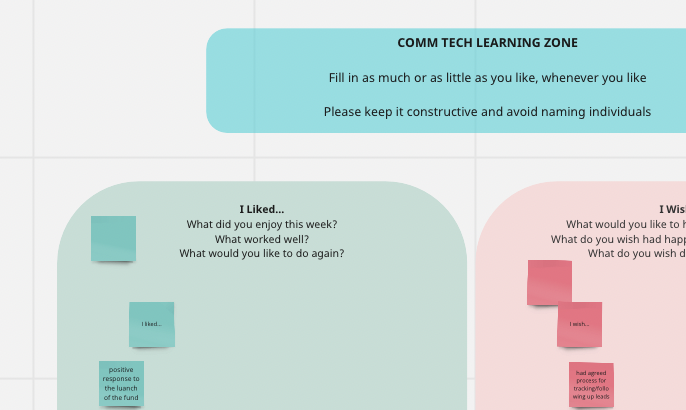Community Tech: Evaluation blogpost #1
Comm Tech learning zone in Miro
Why do we want to evaluate ourselves?
The way we’re delivering the Community Tech programme is new for us all. Power to Change are the initial funders and instigators of the work. Promising Trouble started off our Community Tech journey doing a small piece of research for Power to Change in 2021, and we’re now running the ‘secretariat’ for the whole programme.
What is the secretariat? It’s how we’re organising and steering the programme - organising meetings, building a microsite, bringing new partners into the Community Tech space. It’s a developing, evolving set-up, and a new way of working, so we decided it would be valuable to reflect on how it’s working as we’re doing it, rather than waiting until some point in the future. By trying to develop a learning mindset within the team, and actively reflecting on how we’re working and how it’s going, we hope to not only improve our processes and overall approach, but also find out some things that other organisations might also find interesting.
What are we doing?
We’re taking an approach called an ‘embedded’ evaluation: this basically means that rather than commission an external evaluation expert to come and observe and talk to us from time to time, we are collectively responsible for evaluating ourselves. Of course, this comes with risks (what if we just say that we’re great or terrible at everything? How can we be objective?) and doesn’t necessarily come naturally, but we decided that the benefits of being able to continuously learn and then adjust what we do or how we do it were worth it.
At our weekly stand-ups we’re taking it in turn to be the learning note-taker, jotting down learning points and reflections, big or small, during the meeting, which we’ll then collate and look for common themes or issues. For example, last week we were discussing the deadline for something and realised through contributions from different team members that it would make sense to push it back a week. Does this change the world? No, but it should make the programme work more smoothly, and it came about because the team felt able to debate it and find a solution, rather than keeping quiet about our doubts. We also have a dedicated agenda item at every one of our longer monthly meetings to make sure we’ve got time to talk.
Today, we talked about the launch of the first Community Tech report last month, how it went, and what we can take forward to the next launch. It worked really well to not only have the report to launch, but also a wider programme with an event coming up, information about the fund that’s about to launch, case studies, and ways for people to get involved.
We’ve also got a Miro board that is always open to everyone in the team, where we can pop notes when we have something we want to record or share. We’re trying out a format, using the prompts “I liked… I wish… I wonder…”. We’re going to see how that goes for a month, and if no-one likes it we’ll try something else.
Why are we sharing this with you?
This approach will surely highlight some uncomfortable, messy or just plain silly moments and decisions. So why are we broadcasting this to the world? We think there is value in working in the open, and being honest about what happens behind the scenes. We’re trying something new, and we think others might be interested in how it’s going. Rather than present a polished (but only partially accurate) version, we think there is much more value in sharing it as it happens, and thinking about how to learn from things that don’t go 100% brilliantly. It’s through talking about the tricky bits that we figure out how to make them better.
Did you know that video conferencing links don’t always show up on calendar appointments when you send them from one platform to another? This caused some irritation and wasted time for us, but when we realised it was happening we tweaked how we set up calendar invites, and now it’s working much better. Again, not life-changing, but through incremental improvements like this we’re building up better ways of working together.
If you’d like to chat to us about the Community Tech programme and how we’re running it, please get in touch.


